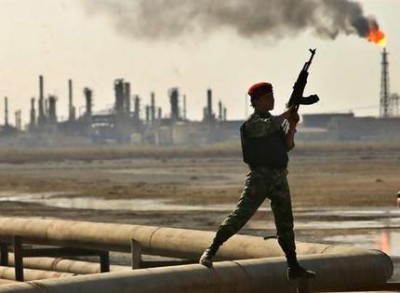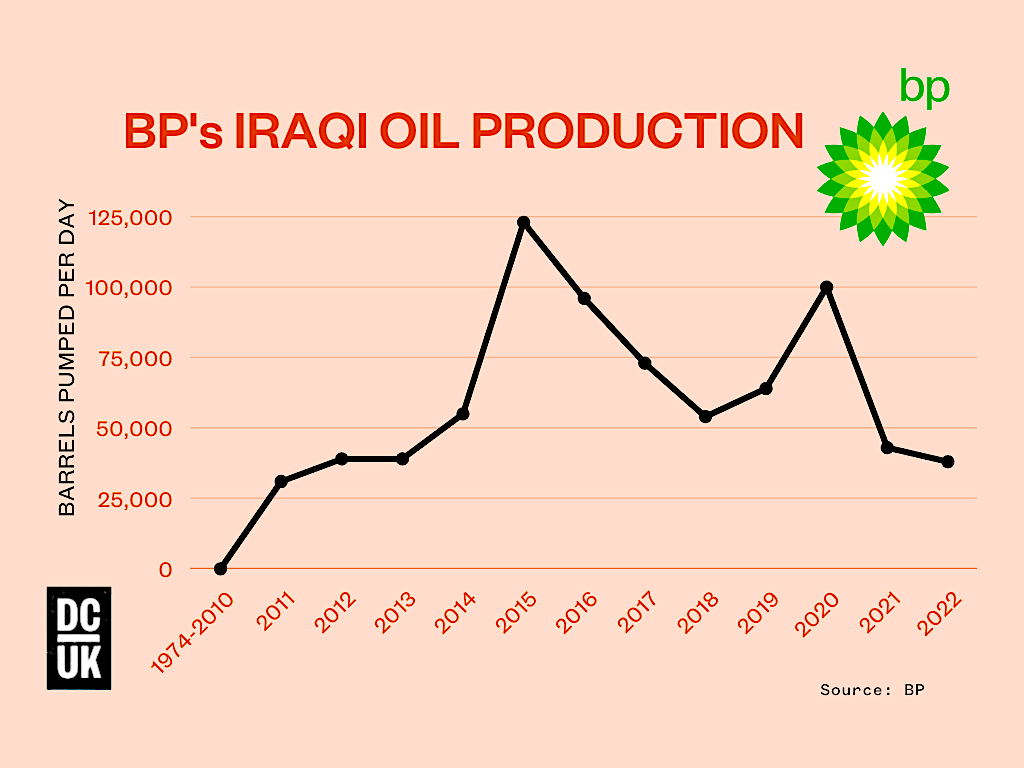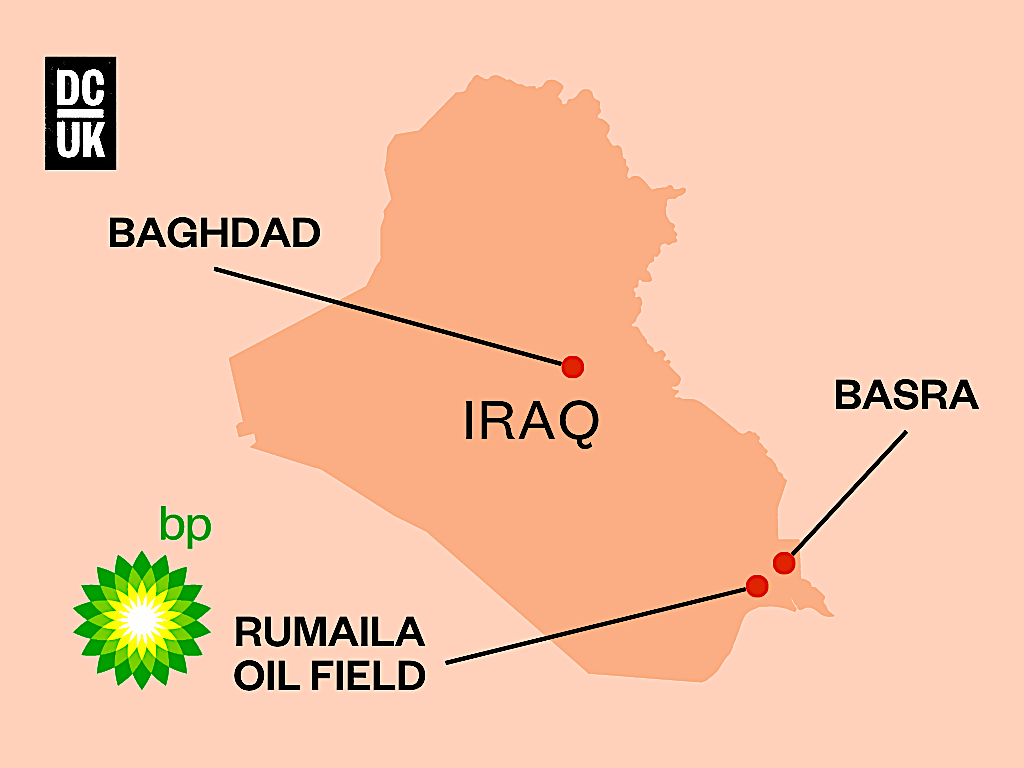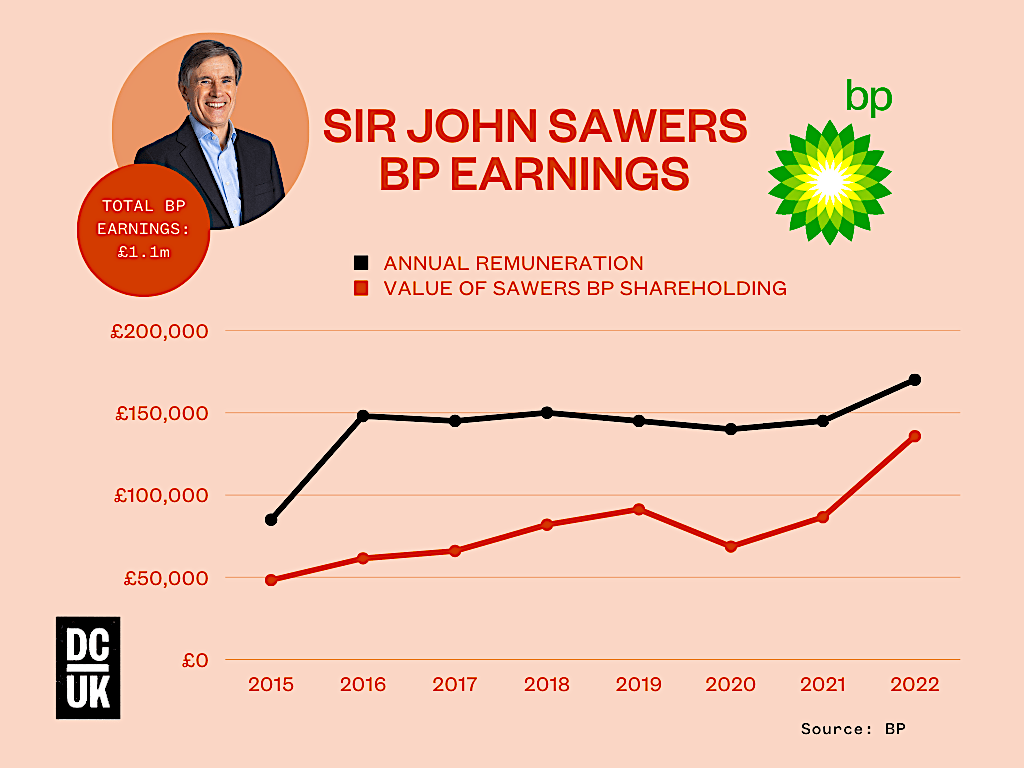BP Extracted Iraqi Oil Worth £15BN After British Invasion
Despite UK ministers denying the war was about oil, the flagship British company reaped a bonanza upon its return to Iraq after the 2003 invasion, Declassified has found.

All Global Research articles can be read in 51 languages by activating the Translate This Article button below the author’s name.
To receive Global Research’s Daily Newsletter (selected articles), click here.
Follow us on Instagram and Twitter and subscribe to our Telegram Channel. Feel free to repost and share widely Global Research articles.
***
BP has pumped oil worth £15.4bn in Iraq since 2011 when it began production in the country for the first time in nearly four decades, new analysis shows.
The new information comes on the 20-year anniversary of the beginning of the invasion of Iraq, which was judged to be illegal by the UN. However, neither US president George W Bush nor British prime minister Tony Blair, the leaders who prosecuted the war, have been subjects of a criminal investigation.
The invasion began in March 2003 and unleashed a catastrophic humanitarian disaster with an estimated 655,000 Iraqis killed in the first three years of conflict, or 2.5% of the population.
It was widely denounced as a war for oil on the part of the US and UK: Iraq holds the world’s fifth largest proven oil reserves. Iraq had no connection to the September 11th terrorist attacks which had taken place 18 months before and initiated the so-called “War on Terror”.
The data on BP’s post-invasion production in Iraq comes from the company’s annual reports and was calculated using the average annual price for a barrel of oil for each year of production.
From 2011-22, BP pumped 262m barrels of Iraqi oil.
Blair Petroleum
The company started producing 31,000 barrels of Iraqi oil a day in 2011, but that number had increased rapidly to 123,000 barrels a day by 2015.
By 2020, BP produced more oil from Iraq than its whole European operation, including Britain’s North Sea.
In the months preceding the 2003 invasion, BP had been dubbed “Blair Petroleum” due to the British prime minister’s intensive lobbying on behalf of the company.
Both BP and Shell have histories in Iraq going back a century, and the country’s oil industry was to a significant extent dominated by the two British companies throughout much of the 20th century.
The Iraq Petroleum Company, which had a virtual monopoly on the country’s oil production in the four decades up to the 1960s, was headquartered in Oxford Street in London. BP and Shell together owned 48%, before it was nationalised in 1972 and its concessions expropriated.

‘Accessing resources’
But BP returned to Iraq for the first time since the 1970s six years after the British invasion. “We continually seek to access resources and in 2009 this included Iraq,” the company stated at the time.
The new opportunity was a contract won from a state-owned company to expand production from the Rumaila field near Basra, one of the largest oil fields in the world. The British Army was at the time occupying Basra and surrounding areas in southern Iraq.
The Rumaila field, which extends 50 miles from end to end, had originally been “discovered” by BP in 1953 and is the largest in Iraq.
The initial Bush administration plan was for the Iraqi government to sign a new oil law which would have indirectly privatised Iraq’s oil through an unconventional type of contracting called “production sharing agreements” (PSA).
These would have allowed foreign oil companies to sign contracts with the government to develop specific areas of Iraq’s petroleum sector in exchange for a share of the oil profits.
But the Iraqi constitution requires the parliament to ratify laws, and because of the internal dynamics in the country at the time the parliament ended up being controlled by nationalist parties with anti-occupation politics.
The Iraqi government had to revert to an older law that only allows for “technical service contracts” (TSC) which kept the oil under Iraqi ownership while giving foreign oil companies a flat rate in exchange for services.
BP’s investment in Rumaila took the form of a TSC, which became effective in December 2009. In the deal BP would recover costs, irrespective of oil price, and get a fee per barrel of production above a defined threshold.
However, the company reported “the technical service contract (TSC) under which we operate in Iraq functions as a PSA [production sharing agreement]”.

‘Lead contractor’
BP was the lead contractor on the Rumaila development, with a 38% working interest. The China National Petroleum Company (CNPC) held 37% with the remaining 25% held by the Iraqi government.
BP said, alongside CNPC, it intended to invest $15bn over the next 20 years to increase production in Rumaila to nearly 3m barrels per day, or 3% of global oil production.
At the time, Rumaila already produced half of Iraq’s oil exports and comprised five producing reservoirs. BP together with its partners would refurbish the wells and facilities.
In its first year of operation, BP increased production from the Rumaila field by 10% above the rate initially agreed with the Iraqi oil ministry, meaning the company became eligible for a share of the oil produced. Over the following decade, BP would extract an average of 65,000 barrels of oil a day from Rumaila.
In 2014, BP increased its working interest in the Rumaila TSC to 48% and the contract was extended by five years to 2034.
“Despite instability and sectarian violence in the north and west of the country, BP operations are continuing in the south,” the company reported.
In 2015, it reported that “we continue to build relationships in BP’s historic heartlands of the Middle East, with growing opportunities” including in Iraq, where BP production hit a high of 123,000 barrels a day. Iraq was now designated one of BP’s “principal areas of production”.
Special representative to Iraq
One figure who has done well out of BP is Sir John Sawers, the UK’s first special representative to Iraq in 2003, who joined the company’s board in 2015.
Over the following seven years, Sawers has earnt £1.1m in fees from the company. His BP shareholding was also worth £135,000 last year, up 181% from when he joined the company.
Sawers joined BP as a non-executive director in May 2015 having apparently been “identified” the previous year as he stepped down as head of MI6, Britain’s external intelligence agency.
“John brings long experience of international politics and security that are so important to our business,” the company reported. Sawers spent the bulk of his career in diplomacy “representing the British government around the world”, BP added. Owing to this experience, BP made Sawers chair of its Geopolitical Committee.
Sawers was close to prime minister Tony Blair in the period around the invasion of Iraq, serving as his foreign policy adviser from 1999-2001. In May 2003, Blair appointed Sawers Britain’s first special representative to post-invasion Iraq.
The role of the special representative was “to work with Iraqis, with Coalition partners and with other representatives of the international community to help and guide the political processes leading to the establishment of an interim administration.”
Sawers then became political director and main board member of the Foreign Office from 2003-07. His influence in Iraq continued as he returned to the country representing the British government in October 2005 in the aftermath of the successful constitutional referendum.
Close to MI6
It appears Sawers had been an MI6 officer earlier in his career. In 2009, when he was appointed head of MI6, the BBC commented: “As Downing Street coyly noted, Sir John is ‘rejoining’ the SIS [Secret Intelligence Service] – no details were given about his previous career in MI6.”
BP has long been close to MI6. In a 2007 Mail on Sunday article, which was subsequently taken down, a company whistleblower claimed “BP was working closely with MI6 at the highest levels to help it to win business…and influence the political complexion of governments.”
Renegade former MI6 officer Richard Tomlinson wrote in his 2001 memoir that BP has “MI6 liaison officers who receive relevant CX [intelligence]”.
Sawers’ predecessor as head of MI6, Sir John Scarlett, was the senior intelligence official responsible for Tony Blair’s notorious dossier on Iraq’s weapons of mass destruction produced in the run-up to the invasion. Scarlett “proposed using the document to mislead the public about the significance of Iraq’s banned weapons”.
Under his relevant skills section, BP reported Sawers’ “management of reform at MI6 also complements BP’s focus on value and simplification.”

Shell’s super giant oil field
The other UK “supermajor” oil company, Shell, also re-entered Iraq in 2009 when it “secured an important position” in the country with a government contract for developing the Majnoon field, again close to Basra in British-occupied southern Iraq.
The company described it as “one of the world’s super-giant oil fields” with an estimated 38bn barrels of oil.
Shell was awarded a 20-year TSC as lead operator with a 45% interest in developing Majnoon. Malaysian oil company Petronas would hold 30% with the Iraqi state holding the remaining 25%.
Production was expected to reach 1.8m barrels of oil a day, Shell said, up from the 45,000 it was producing at the time. Shell also said the field had “additional exploration potential”.
Also in 2009, Shell was awarded a 15% share in a contract for the development of the West Qurna 1 field – again near Basra – as part of an ExxonMobil-led consortium.
This contract was renegotiated in 2014 and the government share was reduced from 25% to 5% and dispersed to other shareholders, including Shell.
However, in 2018, Shell sold out its now 20% interest in the West Qurna 1 field, and its 45% interest in Majnoon field, to the Iraqi government.
BP and Sir John Sawers did not respond to requests for comment.
*
Note to readers: Please click the share buttons above. Follow us on Instagram and Twitter and subscribe to our Telegram Channel. Feel free to repost and share widely Global Research articles.
Matt Kennard is chief investigator at Declassified UK. He was a fellow and then director at the Centre for Investigative Journalism in London. Follow him on Twitter @kennardmatt

